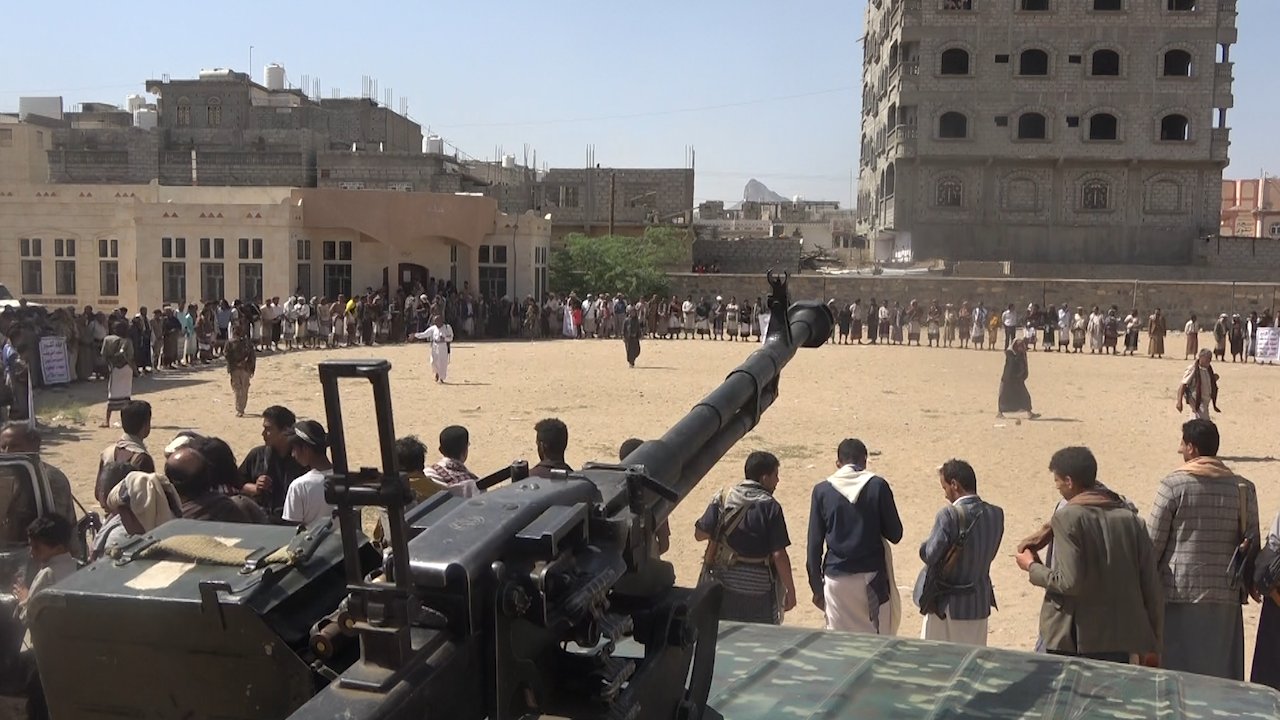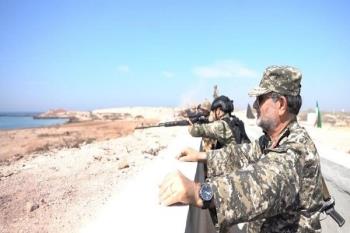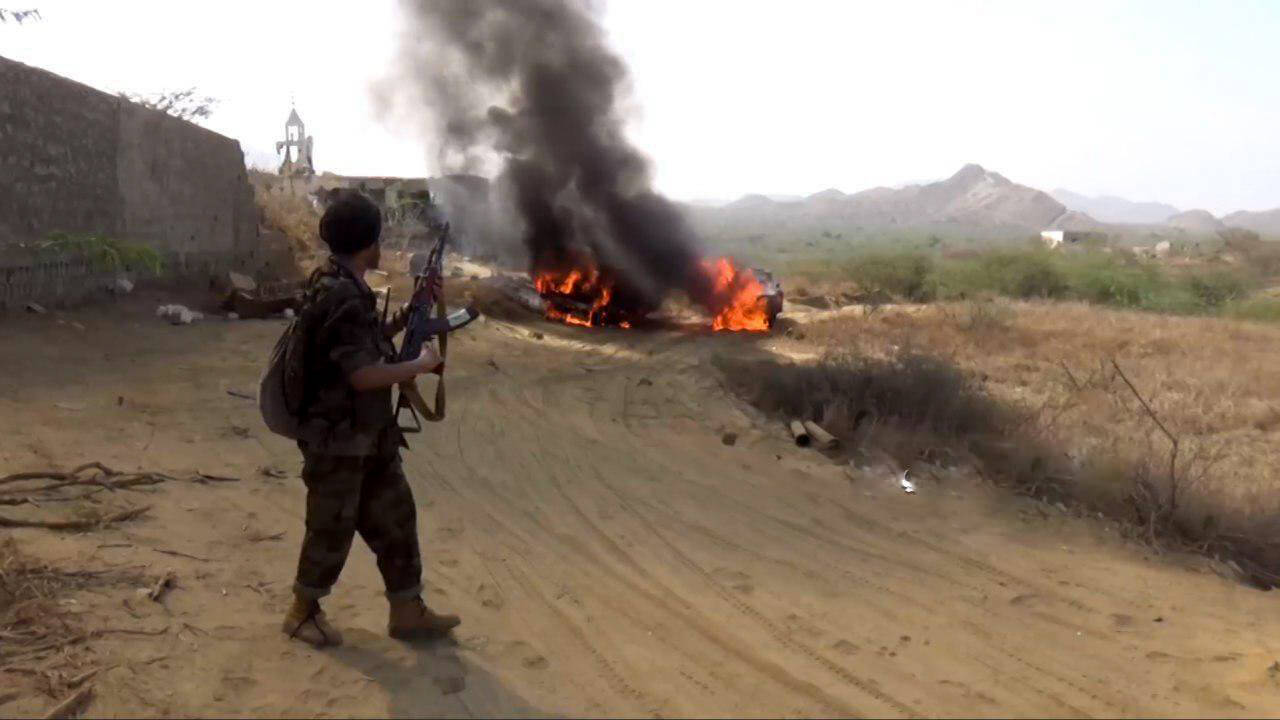“A warplane killed them,” a shocked man in his seventies, draped in Shabwian traditional folk costume, said as he stood over the remains of the burning bodies of a family in Markhah district in Shabwa province, the third-largest governorate by area in Yemen. On Sunday, Saudi warplanes dropped Western-made bombs on the family of Muhammad Hussain Ahmad Lsudi in Nagil Maqwaa, killing him along with his wife and two children. Muhammad, when his vehicle was targeted, was driving home loaded with flour and canned goods, an occasion that the family — who live in a country where most struggle against starvation — planned to celebrate. “Nothing will appease us except that Saudi Arabia and the UAE leave our home,” a grandfather toting an old Kalashnikov on his shoulder told local Yemeni media.
Despite the fact that the United Nations confirmed that the incident took place, the Saudi-led Coalition has evaded responsibility, saying they have no information about airstrikes targeting civilians in Shabwa. Despite this, the killings sparked anger towards the Coalition among residents of the province, which is one of Yemen’s main oil-producing governorates, alongside Hadhramout to its east and Marib to the northwest. Residents in the northwest of the province where the incident took place recently pledged allegiance to Ansar Allah and took up arms to expel Coalition forces and their allies from the district. “The brutal attacks can not scare us or deter us from liberating our land and standing side by side with the honorable,” a Shabwa tribesman declared in the wake of a massive meeting held on Sunday in Baihan, Shabwa.
 Tribesmen in Shawba gather at an event to show solidarity with Ansar Allah and demonstrate their commitment to fighting the Saudi-led Coalition. Twitter | Abdullah Al-Saqqaf
Tribesmen in Shawba gather at an event to show solidarity with Ansar Allah and demonstrate their commitment to fighting the Saudi-led Coalition. Twitter | Abdullah Al-SaqqafIn the wake of the advance of Ansar Allah in Shabwa — which contains Yemen’s largest natural gas reserves, produces over 100,000 barrels of oil per day, and is home to the port of Balha natural gas refinery — the Saudi Coalition resorted to launching a slew of airstrikes targeting heavily populated areas in Shabwa.
Ansar Allah advances
In the past two weeks alone, forces from Sana’a, supported by local Shawba tribes, have seized strategic districts across the province, including Baihan, Usailan, Markha Olaya, and Masourah — districts that were seen as vital to stopping the advancement of Ansar Allah into eastern Yemen. The stunning advance has left the Saudi-led Coalition pointing fingers at each other, with the Saudi military, the Saudi-backed Hadi government in Yemen, and the Southern Transitional Council all laying blame on one another for allowing Shabwa to be taken. Most of the accusations, though, have been laid at the feet of the Islah Party, a branch of the Muslim Brotherhood in Yemen. Despite the finger-pointing, Shabwa’s governor (appointed by the Saudi-led Coalition) acknowledged Ansar Allah’s advance, referring to the group with the often-used pejorative descriptor “the Houthis,” after the group’s late founder, Hussein al-Houthi.
The advance of Ansar Allah in Shabwa came despite massive spending by both the UAE and Saudi Arabia to gain the loyalty of residents and provincial officials by injecting millions into local municipal coffers, a strategy used to some success in other provinces in Yemen to change political loyalties. It also coincided with developments in the nearby al-Bayda and Marib provinces. In al-Bayda, which lies in central Yemen, Ansar Allah partnered with local partisans to retake the province and announced it was fully under their control on September 23. In a wide-sweeping military operation it dubbed “Dawn of Freedom,” Ansar Allah also successfully recaptured the districts of Sawma’ah and Maswarah, as well as large parts of Mukayras, with an area of 2,700 square kilometers. According to Ansar Allah military spokesman General Yahya Saree, the provinces are now free from the ISIS and al-Qaeda elements that once plagued them.
In the strategic oil-rich Marib province, which lies about 120 km (75 miles) east of the capital Sana’a, Ansar Allah stands on the verge of recapturing the capital city, where battles are still raging with the Saudi-backed militants. In recent months, Ansar Allah also took control of the directorates of Hareeb, Majzar and Madghl, despite an estimated 100,000-plus Saudi airstrikes, with 30,000 recorded in Hareeb alone, according to the Ansar Allah-led Yemeni Army.
Ansar Allah peace plan gains adherents
Despite its sweeping victories on the battlefield, the group launched a peace initiative in June, in what they say is an effort to avoid civilian casualties in Marib. The initiative has done little to stem the battles raging on in the province but has engendered great support from local tribes, including local Saudi allies.
The initiative, submitted to mediators from neighboring Oman during a visit to Sana’a, proposes to expel all foreign forces and form a joint command for Marib, joint security forces, and joint technical committees composed of local residents, to run the province. It would also see oil revenues deposited into an independently monitored account to pay the salaries of government employees and fund post-war reconstruction efforts. The deal would further re-open a now-shuttered oil pipeline that extends from Marib to the Sana’a-held Ras Issa port on the Red Sea, release all prisoners of war from both sides, and ensure freedom of movement to and from Marib. While Saudi Arabia has shown strong opposition to the proposal, dozens of agreements have already been inked, based on its tenets, between local tribes, officials, and the Ansar Allah-led government in Sana’a.
While the initiative is picking up steam, the Ansar Allah-led Yemeni Army is still working to oust Saudi forces from Marib through sheer military force. In one of its largest military operations since the war began, operation “al-Ba’ss al-Shadid,” first reported by MintPress News last March, has succeeded in capturing large swaths of Marib from Saudi forces, who mobilized fighters from across the Middle East in a bid to hold the territory.
Last week, Al-Alim al Harbi, a Yemeni media outlet that has published battlefield footage from the war in Yemen since it began in 2015, published nearly an hour of raw footage of some of the fiercest battles since the war began. The footage shows violent clashes, deep inside Marib’s most strategic regions, between Ansar Allah and Saudi-backed Salafist militants allied with the Yemeni Fifth Military District, a highly experienced unit of the Saudi-backed Yemeni government in Aden. The video shows Ansar Allah forces capturing what amounts to a 1,600 square kilometer area containing dozens of military bases — including the infamous Mas Camp, the largest and arguably most important Saudi military base in Marib — and capturing or destroying at least 1,500 mostly American-made armored vehicles, according to Ansar Allah.
Anger at Saudis boils over
The fact that local residents in Shabwa so quickly turned on the Saudi-led Coalition and allied with Ansar Allah, despite the former’s injection of cash into the province, is no surprise for many in Yemen. Like other southern provinces, the people in Shabwa are suffering from a serious humanitarian crisis, thanks in large part to policies enacted by Saudi-backed forces. The collapse of local currency, high prices of food and medicine, and frequent power outages easily outweigh whatever infusion of cash makes its way into local government coffers but seldom into the hands of residents. Yemeni currency, especially in southern provinces, has been in freefall, with the value holding at a mere 1,120 Yemeni Rials to a single U.S. dollar, making food prohibitively expensive in a nation where 80% of the population is reliant on aid.
Anger is also mounting over what many see as blatant Saudi looting of the province’s oil and gas reserves. On September 20, the massive PAROS oil tanker arrived at al-Nashima port in Shabwa from Turkey to transport 107 tons of crude, with an estimated value of $65 million, out of the country without a cent of compensation to locals. On April 11, the SAGA oil tanker arrived at the port of Bir Ali in Shabwa’s Radhum district from the Emirati port of Fujairah to transport a large volume of petroleum products, according to sources working in the oil sector in the southern governorates, and again the people of Shabwa were left without a cent of compensation.
This pillage comes as the agricultural and residential lands located along the oil pipelines that stretch to the port of al-Nashima and the Shabwa coast still suffer from environmental pollution owing to large oil leaks from the poorly maintained pipelines, especially the Sector 4 West pipeline, which began to leak last year and has yet to be repaired.
Anger against the Saudi government has now reached a boiling point, with protests taking place throughout the southern provinces, some of which have turned deadly. In Zinjibar city — a coastal town in south-central Yemen and hometown of the Saudi-backed president, Abdrabbuh Mansur Hadi — hundreds of residents took the street on Sunday, condemning deteriorating living conditions. Shops were closed and the protesters roamed the main street, setting fires and closing off neighborhoods. In Tai`ze, thousands of people took to the streets on Monday to denounce the collapse of the currency, corruption and high prices. A protester was killed when Saudi-backed forces fired live ammunition in an attempt to disperse the demonstrators, who blocked streets and chanted anti-Saudi slogans.
In other southern provinces, major cities including the Saudi strongholds of Aden and Hadhramout have witnessed days of chaos, uproar, killings and arrests. Attempts to subdue the widespread protests that erupted one week ago have largely failed and local authorities loyal to the United Arab Emirates declared a state of emergency, accusing protesters of being “Houthis.” In Hadhramout, where demonstrations take place mostly at night owing to the intense heat, protesters have been killed and others injured by security forces, most recently on Thursday night.



























